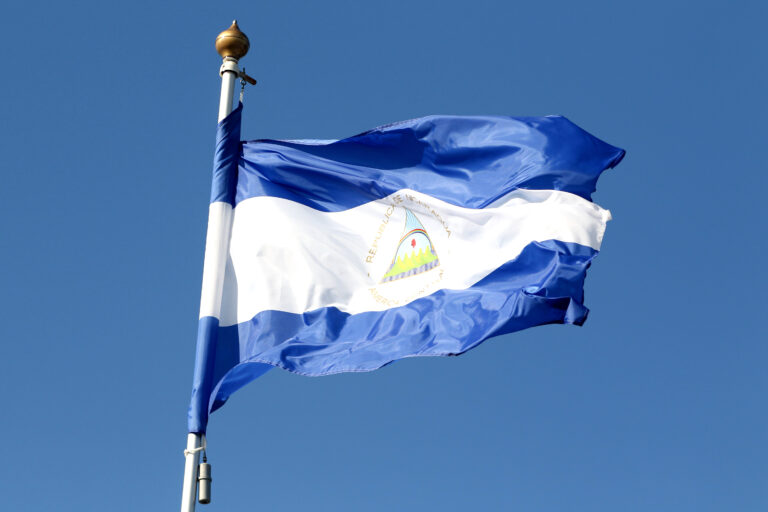April in the Americas: A roundup of key free expression news, based on IFEX member reports.
Venezuela and Honduras are burning. At the time of this article’s publication, both countries are enduring complex and confusing situations, neither of which appear to have an end in sight.
“The beginning of the end of the usurpation has begun,” said Juan Guaidó on the morning of April 30. Guaidó is recognized, by some, as the interim president of Venezuela. The announcement sparked a full day of protests that were marred by repression. Protesters both for and against Nicolás Maduro’s government poured out onto the streets. As members of the opposition announced an end to Chavismo, government authorities maintained that the uprising is nothing more than a “minor” coup that was quickly quelled. Uncertainty is definitely the only constant.
What is clear is that the chaos sparked even further repression of media outlets and journalists. IFEX’s Venezuelan members reported tens of attacks against journalists covering developments on the ground. Meanwhile, the government took several international television stations off their air, including CNN and BBC, as well as Radio Caracas Radio, a local, historic station.
That same dia, in the Honduran capital, violent confrontations and police repression left tens of people hurt, and numerous detained. The clashes followed a series of mobilizations against proposed government reforms to health and education.
Nicaragua’s UPR
Another country with complex political dynamics is Nicaragua. On 18 April, Nicaraguans commemorated the first anniversary of mass protests – and the ensuing violent repression – that left more than 300 people dead, thousands of injured and hundreds detained.
Against this backdrop, in mid-May Nicaragua will undergo a Universal Periodic Review (UPR) at the United Nations. The UPR is a thorough review of human rights that all UN Member States must undertake every five years. In this particular type of review, civil society plays a crucial role.
Given the current situation, IFEX-ALC – a network of organisations that defends freedom of expression in 15 countries across Latin America and the Caribbean – along with the World Association of Community Radio Broadcasters (AMARC-ALAC) and the Inter-American Press Association (IAPA), participated in a mission to the United Nations Office at Geneva prior to Nicaragua’s UPR, which is scheduled for 15 May.
The organisations’ aim was to try to reverse the precarious situation for human rights in Nicaragua. They spoke with delegates and representatives of Member States, shared information about the current context, and advanced several recommendations.
Bittersweet Peru
The Andean Country of Peru underwent an intense month. Civil society celebrated a success in the case of murdered journalist Hugo Bustíos Saavedra. On 12 April, the Supreme Court overturned the acquittal of the alleged perpetrators of Saavedra’s death. Due to pressure from civil society, the court agreed to review the acquittal, a revision that IFEX-ALC had also supported.
Nevertheless, two other developments cast a shadow on the scene. For starters, journalist Gustavo Gorriti and other media workers were blamed for the suicide of ex-president Alan García.
García, president of Peru from 1985 to 1990 and from 2006-2011, shot himself on 17 April when police officers arrived at his home in Lima, prepared to arrest him on accusations of corruption.
Various political figures – among them a former minister and an acting member of Congress – have, in TV interviews and social media posts, publicly blamed Gorriti as one of the perpetrators of García’s death.
Furthermore, the Judiciary accepted a new defamation claim, put forward by Miguel Arévalo Ramírez, also known as “Eteco.” The suit was launched against journalists Óscar Castilla, Executive Director of digital publication Ojo Público, and Edmundo Cruz, from La República newspaper.
Arévalo Ramírez was reportedly targeted in 2016 by said journalists’ investigations. They had named him as the subject of an inquiry by the National Police, the Public Prosecutor’s Office, and the US Drug Enforcement Administration (DEA), who accused Arévalo Ramírez of leading drug trafficking networks.
A subpoena was issued immediately, and both media outlets had their assets frozen.
Bolivia pressures, Ecuador detains
The government of Evo Morales continues to confront media outlets. The Inter-American Press Association (IAPA), urged the government of Bolivia to modify its approach, one that “asphyxiates the finances of independent media outlets and risks employment stability for journalists and staff.” IAPA also denounced political pressure, tax prosecution, and the taxation of free broadcasting services.
In a resolution about Bolivia – approved by the quarterly IAPA meeting that took place at the end of March in Cartagena, Colombia – the organisation requested that Bolivia respect international conventions and treaties protecting freedom of expression. With this, IAPA hopes that Bolivia will avoid imposing “restrictions to this fundamental right by direct means, for example, through free advertising.”
Meanwhile, in Ecuador, on 11 April, at the Quito airport, police detained Swedish citizen Ola Bini. The software developer – who is also an internet privacy and freedom activist – had been residing in Ecuador prior to his arrest. Bini was detained when he tried to board a plane to Japan. According to Ecuadorian authorities, the arrest was justified due to Bini’s relationship to Wikileaks, something that supposedly implicated him in illegal activities.
Bini’s detention sparked international condemnation, and various organisations have called for his immediate release.
Regional reports:
Eight international human rights organisations that make up Voces del Sur (VDS) (Voices of the South) presented a report in Quito on 2 May. Their solemn report examines freedom of expression in Latin America, listing 732 attacks against the press across 8 different countries in 2018.
The VDS project, compiled by IFEX members, was launched in July 2017, with the objective of supporting initiatives to promote and better protect freedom of expression in the region.
Meanwhile, another group of Latin American civil society organisations – among which 3 are IFEX members – released a joint declaration about misinformation online, especially in electoral contexts across Latin America and the Caribbean. In the declaration, the organisations alerted that the direction that the global debate has taken ignores regional and local power dynamics. They added that without a strong and critical position – and without focusing on human rights – the debate can lead to strengthening traditional media monopolies, and encourage censorship.
Freedom on campus: A new rift in the United States
People often think of university classrooms and hallways as areas for free debate, argument and the respectful sharing of ideas. This concept, however, seems to unravel in the United States, a country that was formerly a symbol of freedom of expression on the continent.
A report by our member PEN America about freedom of expression on various American campuses reveals that a rift exists – one that reflects the polarization the country is undergoing.
The report analyzes recent trends in higher education institutions that include the cancellation, or disinvestment, of controversial speakers and the growth of hate speech. The report also analyzes cases of discrimination, in addition to libel and harassment claims against faculty members, with regards to their opinions. The report also warns of the dangers and fallacies of legal media groups who supposedly intend to protect freedom of expression in incredibly polarized campuses.
In Brief:
Mexico: Our member, ARTICLE 19, released its annual report, which includes sobering figures on murders, attacks and threats to journalists across the country. The report emphasises the importance of being courageous and taking action: In the face of silence, do not forgive and forget.
Haiti: Violence and impunity are a constant when it comes to journalism in Haiti, and IAPA’s 2019 report indicates the situation is not improving.
Cuba’s journalism issues continue to be dire, despite a new constitution that enforces the limits to freedom of expression and the press, according to IAPA.
Paraguay: Our member, the Sindicato de Periodistas del Paraguay (SPP), turned 40 years old and celebrated with a series of events and discussions with numerous organisations. The events focused on press freedom — and challenges to it — in Paraguay.
Canada: VICE magazine and journalist Ben Makuch are in the midst of a legal battle to avoid revealing the sources behind an investigation about the so-called Islamic State. The initial sentence in the case ruled in favour of the Royal Canadian Mounted Police (RCMP), who are requesting the information.



